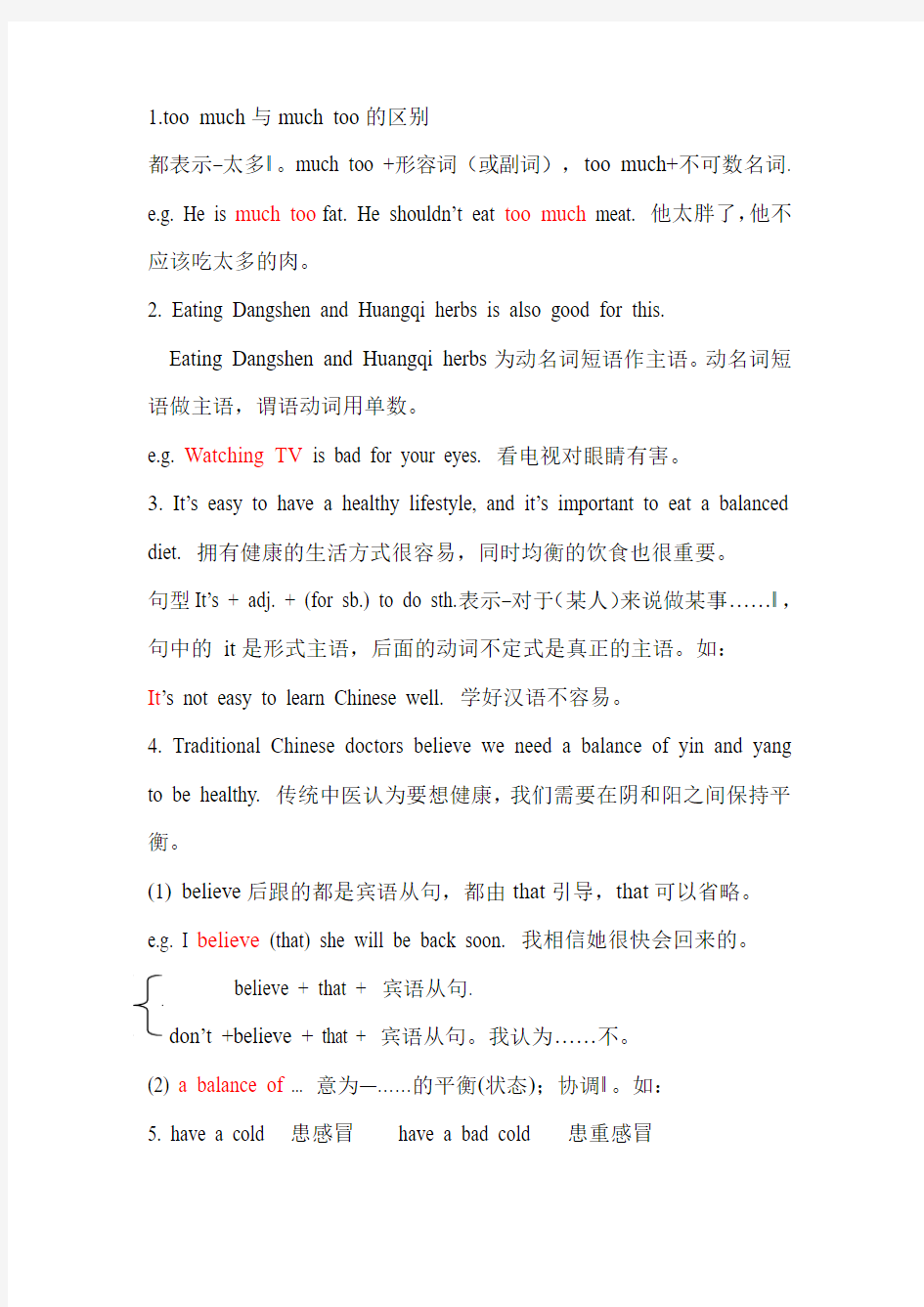八年级上册英语第二单元知识点总结

- 1、下载文档前请自行甄别文档内容的完整性,平台不提供额外的编辑、内容补充、找答案等附加服务。
- 2、"仅部分预览"的文档,不可在线预览部分如存在完整性等问题,可反馈申请退款(可完整预览的文档不适用该条件!)。
- 3、如文档侵犯您的权益,请联系客服反馈,我们会尽快为您处理(人工客服工作时间:9:00-18:30)。
1.too much与much too的区别
都表示―太多‖。much too +形容词(或副词),too much+不可数名词.
e.g. He is much too fat. He shouldn’t eat too much meat. 他太胖了,他不应该吃太多的肉。
2. Eating Dangshen and Huangqi herbs is also good for this.
Eating Dangshen and Huangqi herbs为动名词短语作主语。动名词短语做主语,谓语动词用单数。
e.g. Watching TV is bad for your eyes. 看电视对眼睛有害。
3. It’s easy to have a healthy lifestyle, and it’s important to eat a balanced diet. 拥有健康的生活方式很容易,同时均衡的饮食也很重要。
句型It’s + adj. + (for sb.) to do sth.表示―对于(某人)来说做某事……‖,句中的it是形式主语,后面的动词不定式是真正的主语。如:
It’s n ot easy to learn Chinese well. 学好汉语不容易。
4. Traditional Chinese doctors believe we need a balance of yin and yang to be healthy. 传统中医认为要想健康,我们需要在阴和阳之间保持平衡。
(1) believe后跟的都是宾语从句,都由that引导,that可以省略。
e.g. I believe (that) she will be back soon. 我相信她很快会回来的。
believe + that + 宾语从句.
don’t +believe + that + 宾语从句。我认为……不。
(2) a balance of ... 意为―……的平衡(状态);协调‖。如:
5. have a cold 患感冒have a bad cold 患重感冒
- What’s wrong with you? – I have a bad cold .
6. What’s the matter? 你怎么啦?
当别人遇到什么麻烦,或身体不舒服,你就可以问What’s the matter?意思是你怎么啦?/ 你遇到什么麻烦啦?/ 你哪儿不舒服?还可以在句末用介词with表示对象。
e.g. —What’s the matter with you? 你怎么啦?
—I can’t find my ticket. 我打不到我的票。
What’s the matter? 与What’s wrong? What’s your trouble ?
你怎么了?该句用于询问对方的身体状况,也是医护人员询问病人病情时的常用语。
7. ―have + a +疾病名‖表示―患……(病)。‖
(1)have a cold 患感冒
(2)have a fever 发烧
(3)have a headache 头痛
(4)have a stomachache 胃痛
(5)have a toothache 牙痛
(6)have a sore throat 喉咙痛
(7)have a sore back/have a backache 背酸痛
(8)have a sore neck 脖子痛
